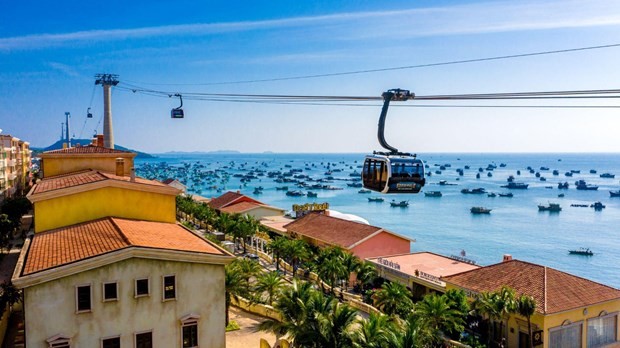
Cable car routes underscore transformation of Vietnam’s economy, tourism
Latest
 |
| The world's longest three-cable ropeway to Hon Thom Island, Phu Quoc. (Photo: Minh Tu) |
On October 25, the leading US daily newspaper ran an article titled "If You Can Take the Cable Car to the Colosseum, You’re in Vietnam" , putting it first in the Travel section and kept it on the home page for many hours.
Take a cable car to the "Colosseum"?
The funny title by the author of the article - reporter Patrick Scott - has aroused a lot of curiosity among international readers. Scott spent time researching cable car systems in Phu Quoc, Sa Pa, Da Nang, and wrote the descriptions based on his own feelings and those of international tourists.
The New York Times writer visited Phu Quoc in March and took the 8km cable car from Sunset Town to Hon Thom Island. He described the sea water at that time off southern Phu Quoc Island seen from the cable car as "as clear as crystal", which is further embellished by hundreds of colourful wooden fishing boats, creating a resplendent scene.
This cable car route is also the inspiration for Scott’s title of the article. He describes the cable car station area as a "full-scale" version of the Colosseum in Rome, and the entire Sunset Town as an elaborate replica of a Mediterranean city in Italy, with a bell tower, baroque fountains and Roman ruins. Scott believes Sun World Hon Thom and Sunset Town tourism areas are among Vietnam's most amazing man-made structures.
"It looked like Disneyland or The Truman Show," said Tomek Tabaka, a Polish tourist.
In Da Nang, Scott commented that the cable car route to the top of Ba Na has transformed the old French hill station into Sun World Ba Na Hills - a European-style theme park, with French villages, Gothic churches, fairy-tale castles and, most notably, the Golden Bridge, a global media phenomenon.
In Sa Pa, he was impressed by the cable car system to Fansipan, Vietnam's highest peak. Tourists will sit on the cable car crossing a sea of thick, white clouds before reaching the clear space at the peak. At Fansipan, tourists will admire spiritual complexes that simulate the architecture of 16th-century Vietnamese pagodas, including a 10-story bell tower, stone staircase system and a giant sitting Buddha statue.
Suvisa Vathananond and Patrick Tunhapong, two Thai tourists, commented that the Sun World Fansipan Legend tourism area strikes a good balance between conservation and development.
The cable car "brings Vietnam to the world"
"Vietnam is home to the world's four longest cable car lines, all built in the past decade, showing the dramatic transformation of Vietnam's economy and tourism industry," the US daily newspaper said, emphasising that the majority of famous cable car systems were developed by Sun Group – honoured as "Asia's Leading Integrated Tourism Group 2022-2023" by World Travel Awards.
Steven Dale, founder of "Gondola Project", a reputable website tracking the global cable car development industry, said that one of the most successful cable car development countries in Asia is Vietnam. According to data from cable car manufacturers, over the last two decades, about 26 cable car lines have been built in dozens of locations across Vietnam, showing the rapid development of facilities serving tourism needs.
The game started in 2007, when the Sun Group founders returned home from Ukraine, starting with the construction of the first cable car line about 6 km long to the peak of Ba Na in the central city of Da Nang, in collaboration with the world's leading cable car group Doppelmayr of Austria.
Since then, Sun Group has launched six Sun World areas with cable cars, earning up to 9 Guinness World Records, such as: The world's longest three-cable ropeway in Phu Quoc; World's biggest cable car in Ha Long (Quang Ninh); The world's tallest cable tower in Cat Ba (Hai Phong); The world's largest vertical climb cable car system to Fansipan peak in Sa Pa (Lao Cai), and The world's longest single-cable ropeway car to the peak of Ba Na (Da Nang).
Positive effects
According to Dale, Vietnam is suitable for cable car constructions due to its abundance of mountains, forests and islands. This is considered a "road" that has faster construction time, is cheaper, and causes less environmental damage than roads.
The New York Times commented that the cable car is meaningful for a developing country like Vietnam. The country's middle class cannot easily afford a trip to Rome (Italy), or Paris (France), but they can easily buy cable car tickets ranging from 25 to 45 USD to visit European-inspired destinations such as Ba Na Hills or Phu Quoc.
The newspaper also clearly pointed out the positive effects of cable cars on the local economy. As noted by the article, with the Sa Pa government, the locality only welcomed 65,000 tourists in 2010, before the highway was built from Hanoi in 2014 and the cable car was inaugurated in 2016. By 2019, the number of tourists had skyrocketed to 3.3 million and reached 2.5 million the previous year during the post-epidemic recovery.
Aside from mixed opinions about Sa Pa tourism, such as on ethnic minority children begging for money and uncontrollable development of buildings and hotels, the cable car has made Fansipan peak more accessible and attracted thousands of tourists every day. One commenter in the article noted that the cable car keeps other Sa Pa destinations from being overcrowded, and indigenous villages better retain their traditional features.













